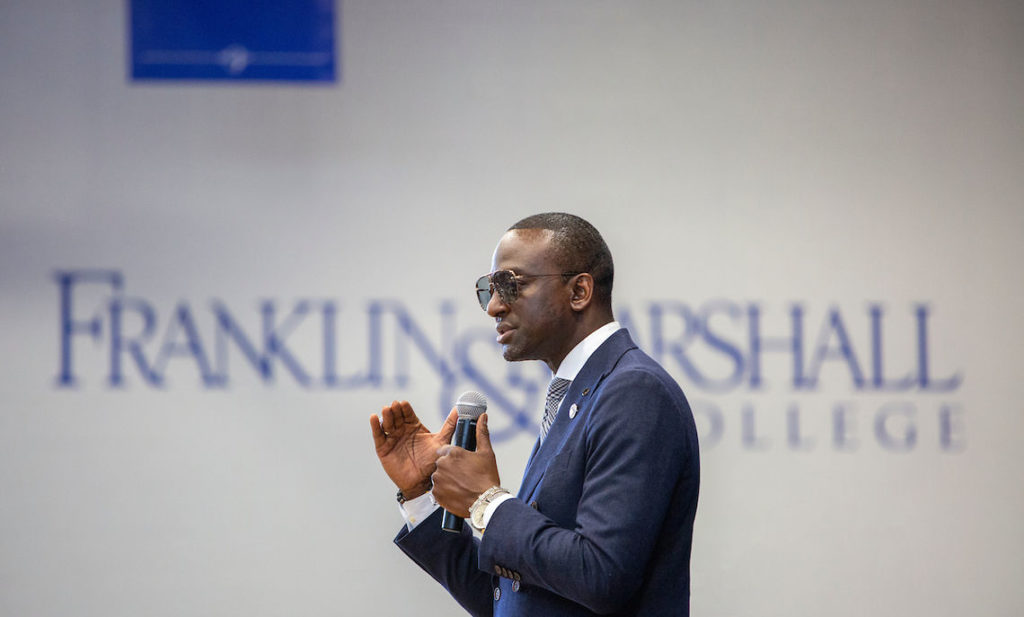
By Nina Kegelman || Staff Writer
“Yusef Salaam, do you have anything to say before we sentence you?”
Dr. Yusef Salaam, one of the “Exonerated Five,” a group of teenagers wrongfully convicted for the 1998 rape and assault of Trisha Meili in Central Park, opened this week’s Common Hour with that question.
The roaring crowd before him quickly quieted. Salaam’s arrival was eagerly anticipated, but as he took the stage, the excitement surrounding his visit fell away, replaced with a more somber recognition of his far from glamorous journey here.
Salaam’s talk, titled “The Criminal (In)Justice System: Guilty Until Proven Innocent,” explored the effects of his false incarceration on his life and the ways he has coped with and overcome the experience. At first, Salaam spoke slowly, deliberately. He’d done seven years for a crime he didn’t commit. One of his best friends did thirteen. Hanging on his words, the Common Hour crowd sat with a sort of uncertainty and impatience perhaps reminiscent of Salaam’s own feelings throughout his ordeal.
But Salaam said at the time of the verdict, he was still hopeful. He still believed that truth would prevail- that it was the criminal justice system. He dove into a poem he’d delivered when he was asked that very first question. “I stand accused,” he repeated rhythmically amidst an articulate rant about the injustice of his accusation. It wasn’t until he finished that it became completely clear that those were the same words written in the court records that the then fifteen-year-old Salaam responded to the judge on the day of his sentencing, along with some words of one of his heroes, Malcolm X.
His “She-ro,” though, as Salaam put it, was his mom. She taught him about resistance: “the struggle.” As he stood stylishly dressed in a suit, scarf, and sunglasses, appearing triumphant over his trials, the messages she instilled in him were evident. Salaam seemed matured by his time in prison. As he put it, he did the time; he didn’t let the time do him.
The talk proved reflective, as Salaam recounted his career successes and spiritual revelations after the devastating conviction. An avid reader, both in prison and out, Salaam found solace in the stories of Joseph written in the Bible and the Quran- a figure who, too, was falsely accused of rape but prevailed free in the end. Eventually, his passion for knowledge led him to his gainful careers in technology, rather than in the painful cycle of recidivism. God has a plan for everyone, he asserted.
Faith predominated Salaam’s talk. In fact, it was the faith and atoning of Matias Reyes, Salaam said, that moved Reyes to confess to the crime in Central Park- ending the thirteen-year sentence of one of the five now exonerated. Salaam did explicitly denounce the racism inherently related to poverty and the prison industrial complex. But he went on to state rather matter-of-factly how the case of the Exonerated Five is about more than what most may think. Instead, he called it “a love story between God and His people.” Becoming free and the truth prevailing were emblematic of how a people could be brought low “only to rise.” Salaam encouraged gratitude to God for “the lessons and the blessings.” Falling down constantly is inevitable; getting back up one more time is essential. Drawing on the wisdom of “the great philosopher, Cardi B,” Salaam pronounced: Fall down 9 times, get up 10… Period.
Salaam, as perhaps many were surprised to find, maintains an optimistic, almost transcendent, perspective on institutions of oppression like racism and the criminal justice system. His advice for the college students before him? Live a full life, pursuing your dreams and ambitions. Underlying Salaam’s story was his defiant defence of the worth of his own life, of poor lives, black lives, or immigrant lives. He stressed the importance of refusing to submit to the toxic messages of systemic racism, affirming value where systems of injustice deny it.
Salaam’s activism flowed easily throughout his inspirational Common Hour talk, resonating among those closest to him in the audience. “Being born here in American doesn’t make you American,” he said, receiving a wave of snaps signaling support and agreement. He spoke out against the PTSD-inflicting family separation at the U.S.-Mexico Border, and he scrutinized the integrity of the 13th Amendment itself, which permits slavery even today. At the same time, Salaam maintained his humor, joking about his daughters, false advertising, and the President of the United States, a figure notoriously implicated in Salaam’s own condemnation.
Nearing the end of Common Hour, he had time to answer just one, but significant, question: How are institutions such as F&M complicit in the oppression of black and brown bodies?
He immediately reframed. “Think of it this way,” he started. While not appearing to want to understate the ways in which predominantly white institutions can alienate students of color, Salaam stayed committed to the bigger picture. “They want us in prison cells,” he said sternly. “Not college dormitories.” Placing the emphasis on doing well in school and encouraging other minoritized students to complete their college education, Salaam shifted the focus of the struggle from one of racial oppression to one of personal fulfillment. At the same time, voting, speaking out, and uniting for the interests of the oppressed are all invaluable for progress. What Salaam’s story ultimately demonstrated, though, as he finished referencing Gil Scott-Heron’s “The Revolution Will Not Be Televised,” is the intimate relationship between the personal and the political, the individual empowerment and the uplifting of a people.
“I know,” he admitted. “I am the revolution.”
Junior Nina Kegelman is a Staff Writer. Her email is nkegelman@fandm.edu.
